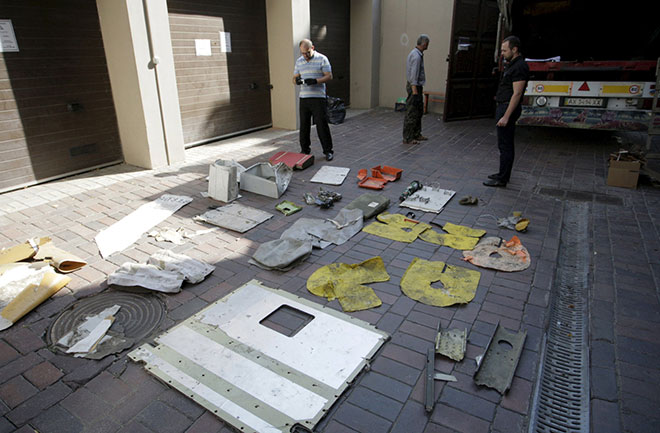
Local workers stand next to pieces of wreckage from a Malaysia Airlines Boeing 777 plane outside the Prosecutor General’s office in Donetsk, Ukraine, Sept 30 before the wreckage, believed to be from MH17, were transferred to Dutch investigators. — Reuters file photo
NEW YORK: Malaysia may sign a treaty with four other nations to set up an independent tribunal to try people responsible for last year’s downing of Malaysia Airlines Flight MH17 in eastern Ukraine.
Malaysian Prime Minister Datuk Seri Najib Tun Razak said a meeting was held among leaders of the five nations on the sidelines of the United Nations General Assembly here to pursue the matter after Russia had vetoed a UN Security Council resolution to set up a tribunal.
“I met with the Prime Minister of the Netherlands, the President of Ukraine, the Prime Minister of Belgium and the Deputy Prime Minister of Australia. We discussed alternative measures because we (Malaysia) promised the world, particularly the families of the victims, that we will seek justice,” he told a news conference at the conclusion of his working visit in New York.
Najib and his wife, Datin Seri Rosmah Mansor, then left for Milan for a working visit to Italy.
The prime minister said that though the move to set up the tribunal under the auspices of the UN failed due to the Russian veto, Malaysia regarded the initiative as a moral victory because a majority of the UNSC members had supported the resolution.
Only three members abstained and one used the veto power, he said.
The UNSC comprises permanent members China, France, Russia, the United Kingdom and the United
States, and 10 non-permanent members who serve for a period of two years.
Malaysia is a non-permanent member up to 2016.
Said Najib: “There are two possibilities. One is through a national court system. Another is to have a treaty among the five countries to establish our own court responsible for this.
“All the five nations were unanimous that we have to pursue and bring to justice the people responsible for their outrageous crime against victims of MH17.”
“We are also waiting for the technical report that will be released on Oct 13,” he said.
The prime minister said that the veto power obstruction did not mean that the desire to seek justice would be stifled.
Flight MH17, a Boeing 777-200 aircraft, was shot down in troubled eastern Ukraine on July 17 last year as it was flying from Amsterdam to Kuala Lumpur with 283 passengers and 15 crew on board.
Besides Malaysians, nationals from the Netherlands, Australia, Indonesia, the United Kingdom, Germany, Belgium, the Philippines, Canada and New Zealand were among the 298 passengers and crew on board.
Najib, when asked about his meetings with US investors and businessmen, said they were confident of the investment climate in Malaysia despite the negative picture painted by some blogs and media recently.
He said more efforts must be taken to engage the investors to provide them with the actual picture of the potentials that existed in Malaysia.
“They appreciate the stability in Malaysia and the certainty of our policies. They were also happy that we are a business-friendly government,” he said.
On the Trans Pacific Partnership (TPP), Najib said International Trade and Industry Minister Datuk Seri Mustapa Mohamad was in Atlanta for the final round of negotiations on the agreement.
He said that after scrutiny by the Cabinet, the draft agreement would be tabled in Parliament for approval.
The United States, in general, accepted the Bumiputera agenda and other rights safeguarded by Malaysia, he said.
The TPP is a proposed trade agreement among several Pacific Rim countries concerning a variety of matters of economic policy. Among other things, it seeks to lower trade barriers, establish a common framework for intellectual property, enforce standards for labour law and environmental law, and establish an investor-state dispute settlement mechanism. — Bernama
